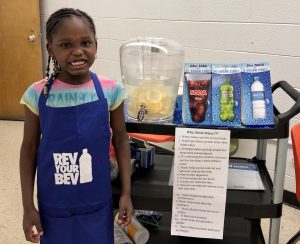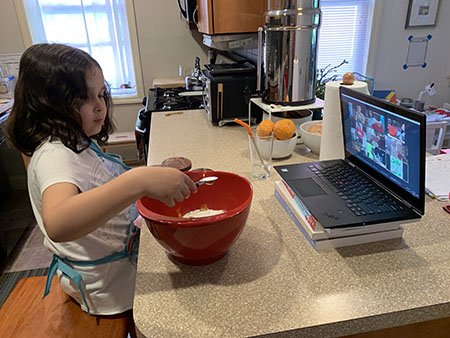NourishEd
One in seven kids lives in hunger, while one in three are overweight or obese. We help kids focus in the classroom and make healthy choices by increasing access to healthy foods and nutrition education.
Sound nutrition is an established foundation for lifelong health: It promotes brain development, acts as a barrier to certain diseases, and positively affects mood and behaviors. Kids who are well-nourished are better able to pay attention in class and make responsible decisions.
 But over 11 million children live in a food-insecure household—and that is only expected to grow due to the COVID-19 pandemic. Most U.S. children consume as much as half their daily calories at school, making schools a crucial piece of the nutrition puzzle. Unfortunately, many schools are not equipped to optimize federal school meal programs, address food insecurity, and provide kids and their families the necessary awareness, knowledge and skills they need to make healthy food choices. In fact, students receive less than eight hours per year of nutrition education, well below the 40-50 hours needed to affect behavior change.
But over 11 million children live in a food-insecure household—and that is only expected to grow due to the COVID-19 pandemic. Most U.S. children consume as much as half their daily calories at school, making schools a crucial piece of the nutrition puzzle. Unfortunately, many schools are not equipped to optimize federal school meal programs, address food insecurity, and provide kids and their families the necessary awareness, knowledge and skills they need to make healthy food choices. In fact, students receive less than eight hours per year of nutrition education, well below the 40-50 hours needed to affect behavior change.
Our NourishEd program is a comprehensive approach to nutrition education and improved food access that aims to improve children’s health by increasing the demand for healthy food among families, students and schools, through student and family engagement, nutrition education and promotion, and district policies, systems and environments; as well as improving the supply of healthy food for kids in schools by increasing the capacity of families and schools working together (family-school partnerships) to ensure schools serve as nutrition hubs. The key components of the NourishEd program model include:
- School meal programming implemented district-wide to increase student access and participation in Child Nutrition Programs (school breakfast, school lunch, after school supper and/or summer meals.
- Evidence-based nutrition education curriculum and promotion strategies grounded in the Dietary Guidelines for Americans and MyPlate best practices to support students in developing nutrition-related habits and behaviors that contribute to positive overall health and well-being.
- Culturally responsive and age-appropriate experiential learning initiatives that provide students with an opportunity to discover new foods, learn about agriculture and food science, and make the connection between nutritious food and social-emotional health. Experiential learning initiatives are designed to promote “learning through reflection on doing” and to create opportunities for students to apply skills and knowledge learned within the context of their community, cultural background and own lived experiences. Learn more about what experiential learning initiatives look like in action with NourishEd.
- Capacity-building learning sessions around school nutrition policies and best practices, federal school meal programs and requirements, increasing food access and healthy eating at school and at home, nutrition education, and strategies for strengthening family engagement in school nutrition programming.
What is AFHK doing?
NourishEd is implemented as a part of our holistic family-school partnership model. We do this by:
- Building strong family-school partnerships that help promote participation in federal school meal programs; encourage adoption of nutrition standards; and establish programs such as cooking clubs, taste tests, and other activities that boost healthy eating.
- Providing district-wide training and support to improve nutrition policies and practices, provide school meal equipment, implement new school meal programming, and initiatives that build opportunities for experiential learning and promote the connection of nutrition with social-emotional health. districts and schools to assist in preparing and delivering meals to students and educate families on available school meal programs and their benefits.
- Creating nutrition resources that anyone can use at home or at school to promote healthy eating and the connection between nutrition and social-emotional health.
- Establishing school nutrition hubs through grant funds and technical support and implementation of federal child nutrition programs. A comprehensive nutrition hub is a school that provides the following:
- Safe and supportive learning environments for students to explore, develop and foster behaviors that will support lifelong nutrition and healthy eating behaviors;
- Opportunities for students to explore and learn the mind-body connection between nutrition and social-emotional health;
- Equitable and inclusive nutrition opportunities and initiatives, representative of the unique strengths of the school community, co-created and/or co-led by families and caregivers.
- Participation in and maximization of at least three of the four child nutrition programs (National School Lunch Program, School Breakfast Program, Child and Adult Care Food Program, and Summer Food Service Program/Seamless Summer Option).
How you can help:
Kids need us to be champions for their healthy development. Whether you’re a parent or caregiver, educator, or invested community member, you can play a part in giving kids the nourishment they need to succeed.
- Donate today to support our work providing grants, resources, and education to the school communities that need our help the most.
- Partner with us to bring optimal nutrition to even more schools and families.
- Learn more about how you can make an impact on meals and nutrition as a parent or caregiver.
- Explore our resources to see how you can inspire kids to eat healthy.
Culturally Relevant Cooking Classes Inspire Kids’ Creativity

The COVID-19 pandemic caused PS 17’s Wellness Council to change course, but the new online cooking classes helped kids get accustomed to trying new, healthy foods that they created themselves.
Read their storyOpens in new window
Get Inspired
For more articles about how schools and parents across the country have improved kids’ health through access to healthy foods and nutrition education, view our success stories.